Sure! Here’s the translation to American English:
The situation in Sudan, especially in the Darfur region, continues to deteriorate amidst a conflict that has caused the displacement of hundreds of thousands of people and a severe humanitarian crisis. According to testimonies from Jocelyn Elizabeth Knight, a Protection Officer with the United Nations High Commissioner for Refugees, many of those who have fled the displacement camps face constant threats from armed men. A child from a shelter shared their distress about not being able to sleep at night, reflecting the trauma many minors in this area are experiencing.
Living conditions in Darfur are alarming, with many people crammed into abandoned public buildings and lacking access to clean water and basic sanitation services. UNHCR has warned of new displacements and attacks on civilians in communities that have already experienced terrible atrocities. Since the conflict began more than two years ago, humanitarian access has significantly decreased, complicating aid delivery. Additionally, seasonal rains are expected to further hinder assistance operations, making many routes impassable for months. Insecurity has also limited agricultural activity, exacerbating food shortages in regions at high risk of famine.
More than 873,000 Sudanese have sought refuge in Chad, which now hosts a third of its population in the eastern region as refugees. The situation is further complicated by a cholera outbreak affecting nearly all Sudanese states, with around 100,000 cases reported since July, posing an immediate risk to an already weakened healthcare system due to the conflict.
In Chad, particularly in the Dougui settlement, cholera cases among the displaced have been documented, highlighting the urgent need to improve access to medical treatment, clean water, and proper sanitary conditions. In response to this crisis, UNHCR has decided to temporarily suspend refugee transfers from border points and has requested $130 million to assist people in Darfur and relocate refugees in Chad.
The threat of unexploded ordnance also adds to the humanitarian crisis, as the UN Mine Action Service has confirmed that these dangerous devices are causing severe harm to civilians in densely populated areas. Recently, minefields have been identified in Khartoum, further increasing the risk to the population in a conflict that shows no signs of resolution in the near future.
Source: MiMub in Spanish











